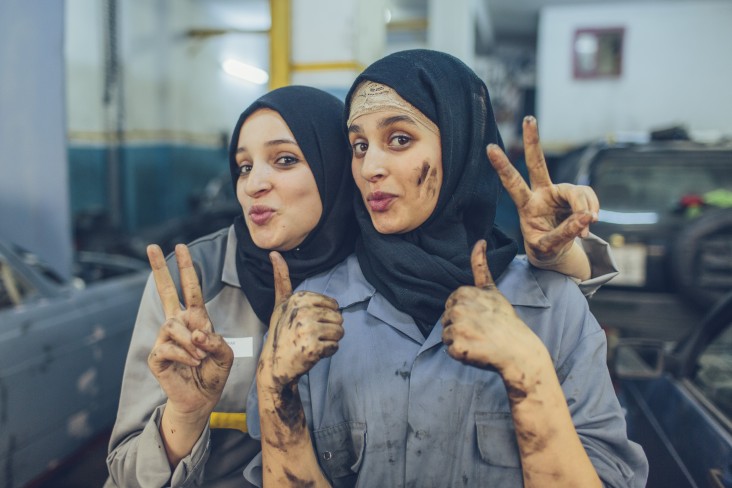Speeches Shim

GENDER EQUALITY IN MOROCCO
Though Morocco has made significant advancements in women’s rights since King Mohammed VI’s ascension to the throne in 1999, it still ranks 137 out of 149 countries according to the 2018 World Economic Forum’s Global Gender Gap Report and ranks 141 out of 149 countries in women’s economic participation and opportunity. Morocco’s 2011 constitutional reforms included several proposals to increase women’s political and economic participation. However, women remain underrepresented in elected office, leave school at younger ages than male students, and do not reach their full economic potential in Morocco.
USAID RESPONSE
USAID addresses gender as a cross-cutting issue with a focus on increasing women’s political and economic inclusion in Morocco. Nearly every activity under the current strategy has a plan to address gender issues. For example, USAID works to address underlying causes of instability in Morocco by providing positive opportunities for youth with a strong focus on young women, who make up a mere 23 percent of the labor market[1]. In Morocco, the unemployment rate is relatively high among youth aged 15-24 (27.5 percent). The rate among women without degrees and those with degrees is 13.8 percent and 17.1 percent, respectively. The unemployment rate of those with a vocational training certificate is 36.5 percent for women and 19.3 percent for men.[2]
In addition, USAID actively promotes female participants as role models through social media, videos, and success stories that include women in non-traditional roles.
PROGRAMS & RESULTS
USAID’s flagship youth employability program Career Center works to reduce women’s barriers to accessing employment opportunities by designing and delivering work-readiness training and career-counseling services. Career Center fosters collaboration with host-institutions such as universities and vocational training institutions, while recognizing the impact teachers and faculty members have on reinforcing positive role models for female students. It continuously encourages private sector partners to adopt a gender-balanced and inclusive approach in recruitment and staff training. In 2018, the Career Center organized 17 gender-specific activities and 41,624 women received career services.
USAID provides direct grants and sub-grants to a number of women’s organizations. The Civil Society Strengthening Program (CSSP), which completed its five-year project in July 2019, conducted an analysis that identified a number of barriers, including the tendency to confine gender issues only to women’s groups. CSSP has supported Civil Society Organizations (CSOs) working on issues of gender integration and equality, including Forum Ezzarahe in Rabat and Association Ennakhil in Marrakech, and work on addressing the problem of gender-based violence, among other gender-related issues. CSSP has worked with civil society groups to develop indicators that capture gender imbalances and social exclusion so that CSOs can better perform advocacy and watchdog roles on gender issues.
USAID’s Favorable Opportunities to Reinforce the Self Advancement of Today’s Youth (FORSATY) program provides positive opportunities for extremely vulnerable youth in the north of Morocco. In this highly-conservative region, traditional norms often deny women the ability to be autonomous, educated, and actively participate in public life. FORSATY partners with local community actors to tackle deep-rooted gender issues to encourage greater female participation in school, the workforce, and extracurricular activities. FORSATY ensured a balanced representation of female youth council leaders with 34 female leaders out of the 67 in total. FORSATY’s education component served 2,011 at-risk students: 976 males and 1,035 females.
The National Program for Reading (NPR) promotes gender equality by organizing focus groups to solicit feedback from women in the teaching force to promote participation and address factors keeping them out of leadership. It also offers professional development coaching for women and works to develop policy actions that reduce stigma for female teachers. In 2018, 11,473 primary and secondary female educators completed professional development activities.
The USAID-Volvo Public Private Partnership has established a Training Academy for Heavy Duty Equipment and Commercial Vehicles, a state-of-the-art vocational training center for the repair and maintenance of heavy equipment and commercial trucks. This activity seeks to increase female participation through special recruitment practices, including developing female-targeted promotional materials and making training facilities more female friendly by providing separate sanitary facilities and changing rooms.
In USAID’s Community Oriented Policing Activity (COPA) activity, women comprised 2,444 out of the 4,765 (over 51 percent) activity beneficiaries during FY 2018. Women leaders from COPA partner associations and neighborhood working groups made up 43 percent of participants in a skills development training that focused on collaborating effectively with police on security issues.
[1] Labor Market in Morocco: Challenges and Opportunities (2018), World Bank.
[2] Haut-Commissariat au Plan (2019), Centre National de Documentation. https://www.hcp.ma/

Comment
Make a general inquiry or suggest an improvement.